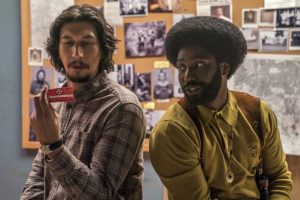By Chic DiCiccio

Photo courtesy of 40 Acres & A Mule Filmworks
The first five minutes of “BlacKkKlansman” feature Alec Baldwin spewing racial epitaphs in what appears to be the making of a bigotry training film. When his sweaty upper lip finally stops moving, he disappears from the movie and is oddly never seen or heard from again.
Then, seconds later, John David Washington’s John Stallworth walks on screen and it only takes a glance from Spike Lee’s directorial eye to make him the coolest guy you’ve seen in a 2018 movie. It’s a microcosm of Lee’s visionary skill behind the camera mixed with his insatiable desire to beat his message into you.
That being said, “BlacKkKlansman” is Lee’s most commercially viable movie in what seems like ages. When the movie sticks to the true story of Stallworth’s 1979 police infiltration of the Colorado Springs chapter of the Ku Klux Klan, it soars. The idea alone of a black police officer calling a Klansman on the phone is ripe for darkly comedic material and it never disappoints in that department.
Stallworth runs into a bit of a sticking point after he agrees to meet with the president of the chapter. Enter Detective Flip Zimmerman (Adam Driver), a white guy who poses as Stallworth in person. Zimmerman slips right into the good graces of this clique of rednecks simply by using the correct amount of ethnic slurs. Needless to say, Klansmen aren’t that bright.
“BlacKkKlansman” is at its very best when showing Stallworth on the phone with KKK grand master David Duke (a shockingly great Topher Grace). The sheer irony of Duke’s arrogance when bragging about being able to identify a black person just by hearing them should not be lost on any viewer.
But like most Lee movies, plot and character development are ignored in favor of themes. The “romance” between Stallworth and the president of the Colorado College black student union, Patrice (Laura Harrier), is dead on arrival. It’s horribly written and nothing more than a reason for the screenplay to have even more political debate as it’s all these two “lovebirds” do.
The chemistry between Washington and Driver is much better and never forced. Driver delivers some extremely difficult and tense dialogue with ease. When he knocks Stallworth’s rookie status on the force, it’s done in an endearing way. Driver is well on his way to becoming a top-level character actor.
If John David Washington felt any pressure being Denzel’s kid and starring in a Spike Lee movie, it doesn’t show. He’s awkward, charming, confident and his screen presence is dominant. He’ll forever be compared to his father, but based on this performance, it will eventually be a very fair comparison.
If it seems like this review is apolitical, that’s because it is. There are themes that will surely upset people from all over the political spectrum.
In moments, Lee seems to be saying that not all cops are bad and violent rhetoric doesn’t do any good for anyone. For as heavy handed as Lee is, this movie is actually quite fair.
The main thrust of “BlacKkKlansman” is that racism and bigotry still exist today. Anyone without their head in the sand should be well aware of that fact. Spike’s greatest achievement with this film is that even though he delivers that message with a sledgehammer, he’s done it in an extremely entertaining way while telling a mostly true story that’s too crazy to believe.
Some people will like “BlacKkKlansman” more than others. Except racists. They’ll hate it … so can it really be that bad?
